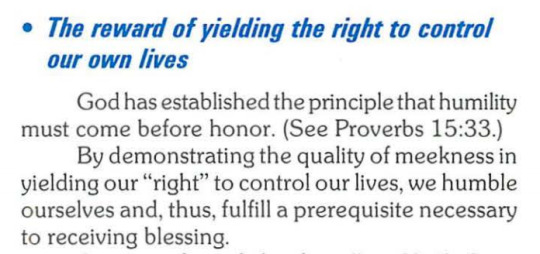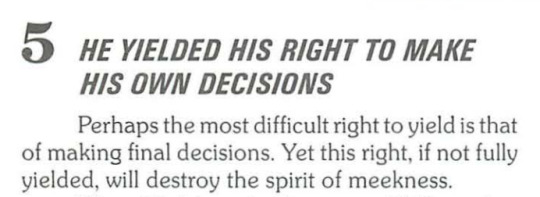dispatches from the wisdom booklets of the institute for better life principles (iblp). i am ex-christian and condemn the iblp’s history of abuse—this blog is for educational/humor purposes.
Don't wanna be here? Send us removal request.
Text



8 notes
·
View notes
Text



3 notes
·
View notes
Text

1 note
·
View note
Text
Oh wow, I completely forgot that most protestants don't use the Apocrypha! I grew up Catholic so I guess it didn't register as weird to me when I was first reading this section. I screenshotted this a long time ago so I'd have to go back to see what more they say about Maccabees, but I'm realizing now what an interesting inclusion this is.
Obviously many protestants would know about Maccabees or find it "useful", but IBLP's treatment of Maccabees here and elsewhere could potentially serve as a helpful bellwether for IBLP theological foundations (given that they otherwise class themselves as "non-denominational", a term that means nothing and only serves to obscure a church's actual beliefs). Bill Gothard studied at Wheaton College (interdenominational evangelical, founded by Wesleyan Methodists) and Louisiana Baptist University, so I'd be curious what kind of material on Maccabees Gothard would have encountered in those contexts, and whether the IBLP affirms or diverges from those encounters. I'm assuming it'd affirm a general Protestant understanding, but that's just my impression. This whole thing would also require you first to answer a larger question of whether these different Protestant denominations tend to emphasize different arguments against Maccabees and the Apocrypha (and ig prayer for the dead? bc that's in Maccabees I think lol).
This is more just me speculating on a potential vein of research—I'll end up looking into it if I ever end up looking into it. Obviously most of what catches people's attention with the IBLP (for good reason) is the extreme, wacky fundamentalist beliefs, but I admit I'm kind of fascinated with the opinions these fundamentalists might have on the more longstanding/less flashy theological questions.
Beware a major tangent lol. Last year I did a semester-long ethnography on a certain church-planting organization in the SBC—as far as churches go, much less dangerous than the IBLP and not imo deserving of the "fundamentalist" label, but still bearing a few cult allegations that I was interested to examine for myself. You can only get so much info out of a semester-long relationship, but in talking to several leaders in the church (as well as a person very close to the main heads of the church), I found that several of them didn't even really keep themselves abreast of current theological discussions going on in the SBC (notably the debate over women pastors), nor did they seem to believe those discussions had significant bearing on the work they were doing in their organization (despite having many women who, though they were not labeled as such, did the work of pastors—but I'm getting further off topic).
I'm giving the example of women pastors, arguably one of the MORE flashy theological questions, but the example is useful to me because it represented an attitude toward theological debate that was not fast and loose, per se, but which treated it as secondary to whatever on-the-ground work would keep their organization running and growing. This isn't uncommon by any means—if you have an organization of that size, keeping it afloat becomes the most important thing—but admittedly I saw it as them possessing an odd lack of curiosity in what their church actually believes. Don't you wonder why you, as a church, are affiliated with the denomination that you are? Why you use the translation of the Bible that you use? Why you structure yourselves the way you do?
Going back to the IBLP, it just makes me wonder about the intentions behind labeling your church "non-denominational" in the first place. The most common explanation is about avoiding "rigid dogmas" and accepting a wider tent, but when you're a fundamentalist non-denominational church with a charismatic leader, that just doesn't hold water. Therefore the most immediate explanation in my mind is about organizational power and logistics—you want to be able to run your church with minimal oversight, you don't want to have to answer to anyone. The second most immediate explanation is about power over belief—you want to be able to preach according to what you believe (or, less generously, according to what you want your congregation to believe). You want the option to adjust mainline doctrine when you disagree with it. Maybe you want the option to smoothly renege on certain beliefs when they come under fire.
This "power over belief" option is most clearly utilized to extreme fundamentalist ends, but would an organization like the IBLP ever care to utilize the power over belief forged by a non-denominational label to more obscure ends? Like, this is DEFINITELY not the case here, cannot stress that enough, but can you imagine if Bill Gothard was just randomly like "actually we're accepting the Apocrypha into our canon because I say so"? It's non-denominational, you can do anything! Listen to your inner testimony and go reinvent Nestorianism or something! If you as a church are not willing to accept that (or even something as simple as a translation of the Bible that's not the KJV or the ESV), then you've just discovered that you are not, in fact, truly non-denominational. You have found a line you're not willing to cross. In that case, you're probably just recycling the beliefs of some other church while distancing yourselves from them in order to market yourselves or retain control.

#discussion#apologies for the length of this reply lmao#it's also possible that some of these questions I have are already quite clear to someone who knows more about the IBLP or who grew up in a#protestant or non-denominational setting. but that's not me haha
25 notes
·
View notes
Text

#weird moment of honesty here. though the maccabean revolt was a jewish rebellion....#so even in their moment of candor they're still kind of deflecting it back to say#“this kind of thing happened BEFORE christ actually we christians would never"#thus nullifying their statement#iblp#ex christian#exvangelical#apostate
25 notes
·
View notes
Text

1 note
·
View note
Text

9 notes
·
View notes
Text

2 notes
·
View notes








